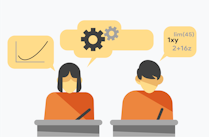Aptitude Test: Free Practice Aptitude Tests (2025)
All products and services featured are independently selected by WikiJob. When you register or purchase through links on this page, we may earn a commission.
- What Is an Aptitude Test?
- How Do Aptitude Tests Work?
- When Might You Take an Aptitude Test?
empty
empty
empty
empty
empty
empty
empty
- What Are the Different Types of Aptitude Test?
empty
empty
empty
empty
empty
empty
empty
empty
empty
empty
empty
empty
- Take a Free Practice Numerical, Verbal and Diagrammatic Test
empty
empty
empty
- Test Structure for Aptitude Tests
- Scores and Marking for Aptitude Tests
empty
- How Do I Prepare for Aptitude Tests in 2025?
empty
empty
empty
- Tips for Success in passing Aptitude Tests
- Who Are the Different Aptitude Test Providers?
- Frequently Asked Questions
What Is an Aptitude Test?
An aptitude test is a systematic means of testing a job candidate's abilities to perform specific tasks and react to a range of different situations.
The tests each have a standardised method of administration and scoring.
The results are quantified and compared with all other test takers.
No prior knowledge is needed, as the tests measure innate ability at a particular competency.
How Do Aptitude Tests Work?
Aptitude tests are usually administered online – most often after a candidate has made their initial job application – and are used to filter unsuitable applicants out of the selection process, without the need for time-consuming one-to-one job interviews.
Employers use aptitude tests from a variety of providers – such as SHL, Talent Q and Cubiks – alongside general interview advice, application forms, assessment centres, academic results and other selection methods.
No test is perfect, but all aim to give an indication of how candidates will respond to the challenges they will face in their day-to-day role at a firm.
The tests can be taken online or at a testing centre, such as a firm's offices, where they are usually paper-based.
Often a firm may ask you to complete both types of test, to confirm you did not cheat during the initial unsupervised online test.
When Might You Take an Aptitude Test?
Aptitude tests are commonly used in various contexts to assess an individual's abilities and potential in specific areas.
Here are some situations where you might encounter or be required to take an aptitude test:
Employment or Job Applications
Many employers use aptitude tests as part of their recruitment process to assess candidates' suitability for specific roles.
These tests can evaluate cognitive abilities, problem-solving skills, numerical reasoning, verbal reasoning, spatial reasoning and other relevant skills.
Career Assessments
Aptitude tests are often employed in career counseling or guidance programs to help individuals explore their strengths and interests, and identify suitable career paths.
These tests can provide insights into a person's natural abilities and talents.
Education Admissions
Aptitude tests may be used as a criterion for admission to certain educational programs or institutions.
For example, schools or universities offering specialized courses, such as engineering, may require applicants to take aptitude tests to assess their aptitude for the subject.
Vocational Training Programs
Aptitude tests are utilized in vocational training programs to determine an individual's suitability for a specific trade or skill.
These tests help identify candidates who possess the necessary aptitude and potential to excel in the chosen field.
Professional Certification Exams
Some professional certifications or licensing bodies may include aptitude tests as part of their qualification requirements.
These tests help ensure that candidates have the requisite skills and knowledge to practice in their respective fields.
Talent Identification and Development
Aptitude tests can be used to identify individuals with exceptional abilities or talents in certain areas, such as sports, music or the arts.
These tests assist in recognizing potential and guiding individuals towards appropriate training and development opportunities.
Personal Development and Self-assessment
Individuals may voluntarily choose to take aptitude tests as part of their personal development journey.
These tests can provide insights into their strengths and areas for improvement, helping them make informed decisions about their career choices or skill development.
Prepare for Any Job Assessment Test with JobTestPrep
What Are the Different Types of Aptitude Test?
These are the most common types of aptitude test that you will encounter:
Numerical Reasoning Tests
Numerical reasoning tests assess your ability to interpret data and do basic math, including fractions, percentages and currency translation.
Learn more about numerical reasoning tests by visiting our dedicated article
Prepare for Any Job Assessment Test with JobTestPrep
Verbal Reasoning Tests
Verbal reasoning tests assess your ability to comprehend passages of text and make accurate deductions.
Learn more about verbal reasoning tests by visiting our dedicated article
Prepare for Any Job Assessment Test with JobTestPrep
In-Tray Exercises
In-tray exercises provide a simulation of an email inbox, where you are required to respond to an imagined scenario. Often these will be followed by an interview or presentation at an assessment centre.
Learn more about in-tray exercises by visiting our dedicated article
Prepare for Any Job Assessment Test with JobTestPrep
Diagrammatic Tests
Diagrammatic tests measure your logical reasoning ability, usually under strict time conditions. They usually require you to infer a set of rules from a flowchart or similar diagram, and then to apply those rules to a new situation.
Learn more about diagrammatic tests by visiting our dedicated article
Prepare for Any Job Assessment Test with JobTestPrep
Situational Judgement Tests
Situational judgement tests are psychological tests that assess your judgement in resolving work-based problems.
Learn more about situational judgement tests by visiting our dedicated article
Prepare for Any Job Assessment Test with JobTestPrep
Inductive Reasoning Tests
Inductive reasoning tests are designed to examine a candidate’s abstract reasoning ability. They identify how well a candidate can see the underlying logic in patterns, rather than words or numbers.
Learn more about inductive reasoning tests by visiting our dedicated article
Prepare for Any Job Assessment Test with JobTestPrep
Cognitive Ability Tests
Cognitive ability tests measure intelligence through logic, reasoning and problem-solving exercises.
Learn more about cognitive ability tests by visiting our dedicated article
Prepare for Any Job Assessment Test with JobTestPrep
Mechanical Reasoning Tests
Mechanical reasoning tests assess your ability to apply mechanical or engineering principles to problems; they are often used for technical roles.
Learn more about mechanical reasoning tests by visiting our dedicated article
Prepare for Any Job Assessment Test with JobTestPrep
Watson Glaser Tests
Watson Glaser tests are often used by law firms to assess a candidate's ability to critically consider arguments. There are five types of question, each tests a different aspect of critical thinking (inferences, assumptions, deductions, interpretations and evaluation of arguments).
Learn more about Watson Glaser tests by visiting our dedicated article
Prepare for Any Job Assessment Test with JobTestPrep
Abstract Reasoning Tests
Abstract reasoning tests use diagrams, symbols or shapes instead of words or numbers. They involve identifying the underlying logic of a pattern and then determining the solution to test general intelligence and reasoning ability.
Learn more about abstract reasoning tests by visiting our dedicated article
Prepare for Any Job Assessment Test with JobTestPrep
Spatial Awareness Tests
Spatial awareness tests assess your ability to form mental images and visualize movement or change between them. They are often used in applications for jobs in design, engineering and architecture.
Learn more about spatial awareness tests by visiting our dedicated article
Prepare for Any Job Assessment Test with JobTestPrep
Error Checking Tests
Error checking tests are an unusual type of aptitude test that focus on your ability to identify errors in complex data sets, such as codes or combinations of alpha-numeric characters.
Learn more about error checking tests by visiting our dedicated article
Prepare for Any Job Assessment Test with JobTestPrep

If you need to prepare for a number of different employment tests and want to outsmart the competition, choose a Premium Membership from JobTestPrep.
You will get access to three PrepPacks of your choice, from a database that covers all the major test providers and employers and tailored profession packs.
Prepare for Any Job Assessment Test with JobTestPrep
Take a Free Practice Numerical, Verbal and Diagrammatic Test
If you would like to practise simulation numerical, verbal and diagrammatic reasoning tests, please try the ones below, which were created by WikiJob in association with psychometric experts, and which are closely modelled on real tests.
The numerical test consists of 10 questions to be answered in 10 minutes, while the diagrammatic and verbal tests consist of 5/10 questions to be answered in 5 minutes (although there is no timer on the test itself).
Our tests are slightly harder than the real thing, in order to make them sufficiently challenging practice.
Don't forget to first check out the test tips and techniques mentioned further down this page.
You can take the tests as many times as you like.
Click the 'Take test' link below on either to get started.
WikiJob also has a psychometric tests app, available for both Android and Apple devices, which includes 10 numerical tests and 8 verbal tests.
The tests include a timer and worked solutions at the end.
Numerical Practice Test
Try this numerical reasoning practice test similar to SHL, PSL and the GTIOS psychometric tests used by many companies as part of their application process.
| Questions | 10 |
| Pass Percentage | 80% |
| Time Limit | 7 min |
Prepare for Any Job Assessment Test with JobTestPrep
Verbal Reasoning Practice Test
Verbal reasoning tests are used by interviewers to find out how well a candidate can assess verbal logic. SHL is perhaps the most well-known producer of verbal reasoning tests, and the most widely used.
| Questions | 10 |
| Pass Percentage | 80% |
| Time Limit | 5 min |
Prepare for Any Job Assessment Test with JobTestPrep
Diagrammatic Reasoning Test
Diagrammatic reasoning tests assess your capacity for logical reasoning, using flowcharts and diagrams. Try these five practice questions, designed to be similar to those used by major graduate employers.
| Questions | 5 |
| Pass Percentage | 80% |
| Time Limit | 5 min |
Prepare for Any Job Assessment Test with JobTestPrep
Test Structure for Aptitude Tests
Tests are timed and are typically multiple-choice.
It is not uncommon for some available answers to be deliberately misleading, so you must take care as you work through.
Some tests escalate in difficulty as they progress.
Typically these tests are not designed to be finished by candidates.
Scores and Marking for Aptitude Tests
Your score relates your performance to an average group.
Your aptitude, ability or intelligence has a relative value to this average result.
Typically, an 'average' performance is all that is required to pass an aptitude test.
Most employers take people's backgrounds into consideration for marking.
For example, maths graduates will have an unfair advantage over arts graduates on a numerical test.
Consequently, most employers use these tests as only part of the assessment process.
Negative Marking
Many aptitude tests incorporate negative marking.
This means that for every answer you give incorrectly, a mark will be deducted from your total (rather than scoring no mark).
If this is the case, you will normally be told beforehand.
In any test that does incorporate negative marking, you must not guess answers, even if you are under extreme time pressure, as you will undo your chances of passing.
What exactly is an aptitude test and how should you approach one? Find out more in this short video.
How Do I Prepare for Aptitude Tests in 2025?
Practice in Advance
Evidence suggests that some practice of similar aptitude tests may improve your performance in the real tests.
Practice exam technique and try to become more familiar with the types of test you may face by completing practice questions. Even basic word and number puzzles may help you become used to the comprehension and arithmetic aspects of some tests.
WikiJob recommends practising aptitude tests prior to the real assessment. JobTestPrep offers a wide range of professionally constructed psychometric questions, written in the same style as PSL and SHL tests (the tests most graduate employers use to assess candidates).
Aptitude tests can also be practised with similar providers such as AssessmentDay.
Preparation Before the Test
Treat aptitude tests like an interview: get a good night's sleep, plan your journey to the test site, and arrive on time and appropriately dressed.
Listen to the instructions you are given and follow them precisely.
Before the actual aptitude test itself, you will almost certainly be given practice examples to try. Make sure you ask questions if anything is unclear at this stage.
You will normally be given some paper on which to make rough workings. Often you can be asked to hand these in with the test, but typically they do not form part of the assessment.
Taking the Test
You should work quickly and accurately through the test. Don’t get stuck on any particular question: should you have any problems, return to it at the end of the test.
You should divide your time per question as accurately as you can – typically this will be between 50 and 90 seconds per question.
Remember that the tests are difficult and often you will not be expected to answer all the questions. Be particularly cautious if the aptitude test uses negative marking; if this is not the case, answer as many questions as possible in the time given.
Remember that multiple-choice options are often designed to mislead you, with incorrect choices including common mistakes that candidates make.
Tips for Success in passing Aptitude Tests
These five tips are well worth remembering before you take an aptitude test for real:
- Treat the test like you would any other exam
- Work swiftly and accurately through any test
- Work out the maximum time you can spend on any question and stick to it religiously. You can return to questions at the end. Never get stuck on any particular question, even if you think you nearly have it.
- If you are going to an assessment centre, take a calculator you understand with you. If you do not, you will be forced to use whatever they might provide you with.
- Answer as many questions as possible in the time given. But be wary of negative marking.
WikiJob recommends taking practice reasoning tests for better performance during the examination.
Our partner JobTestPrep has copious sample tests to try, until you have really mastered this type of assessment.
Prepare for Any Job Assessment Test with JobTestPrep
You may also want to look at this psychometric workbook, which covers numerical, verbal and spatial reasoning tests, with hundreds of practice questions.
Who Are the Different Aptitude Test Providers?
There are numerous organisations that produce aptitude tests, including:
- SHL. An international company operating in over 50 countries, providing tests in over 30 languages.
- Kenexa. An IBM company providing recruitment services to organisations in a variety of industries.
- Cubiks. An international HR consultancy that provides psychometric tests and runs assessment centres for employers.
- Talent Q. An organisation owned by Hay Group, which provides assessments whereby a single test can be used to measure a number of different aptitudes.
- CAPP. A provider of aptitude packages that test powers of analysis, comprehension and technical ability.
Frequently Asked Questions
A career aptitude test is designed to assess a person’s work-related cognitive ability or intelligence. Test questions are designed to assess logical reasoning skills and mental ability.
A career aptitude test assesses a range of abilities, including diagrammatic reasoning, mechanical reasoning, numerical reasoning and verbal reasoning.
Each test has a standardised process for administration and scoring, with test results being quantified and compared with the results of other test-takers.
A career aptitude test measures a person’s innate ability in certain competencies, so no prior knowledge of the subject matter is required.
Aptitude tests measure a person’s logical reasoning skills and mental ability.
During an aptitude test, test-takers must answer questions designed to assess their diagrammatic reasoning, mechanical reasoning, numerical reasoning and verbal reasoning skills.
Aptitude tests are a useful way to assess a person’s intelligence and find out what they are capable of doing, rather than how they do things.
A job assessment test is used by many employers as part of the vetting and hiring process. Some employers ask shortlisted candidates to complete a job assessment test prior to the interview stage, whereas others incorporate them as part of the interview or assessment centre.
Results from a job assessment test help employers to narrow down the selection pool to make an informed hiring decision.
Each job assessment test is slightly different, but they usually focus on soft skills and general competencies.
The Situational Judgement Test (SJT) is an example of a psychological aptitude test. During an SJT, the test-taker must solve a range of problems related to typical workplace scenarios.
Each question has a set of multiple-choice answers, with candidates being asked to choose the most effective and least effective answers, or rank the answers according to how effective they would be in the given scenario.
SJT’s are a popular tool for hiring managers, as they are designed to measure a person’s aptitude for solving problems, making decisions and maintaining effective working relationships.
Other types of job assessment tests are designed to assess a candidate’s suitability for a certain job role, whereas the SJT assesses whether a candidate will be a good fit for a particular working environment.
Ability tests are a type of cognitive assessment. They are designed to measure a candidate’s mental performance.
Many employers use ability tests as part of the recruitment or hiring process. Popular examples include the Predictive Index, Revelian and Wonderlic tests.
In this type of psychometric assessment, test-takers must solve logic puzzles, reasoning assessments and problem-solving questions.
A person’s test results are used to determine their overall intelligence.
Cognitive ability tests tend to be computer-based, with questions presented in multiple-choice format. For most ability tests, candidates are given a time limit within which to answer as many questions as possible, but in some cases, candidates will be expected to answer all of the test questions.
The exact scoring method which is used will largely depend on which aptitude test you are taking.
As a general rule, scores are gathered and ranked in comparison to your peers.
This information is used to calculate an ‘average’ score. Your result is ranked against the ‘average and is used as a comparison and guide to your performance.
Aptitude tests can be used for a wide variety of reasons depending on the age and individual situation of the participant. Some of the common uses of aptitude tests include:
- Assessing whether children should be entered into gifted and talented programs
- Assessing whether potential employees have the aptitude required to succeed within a workplace
- For personal information relating to individual skills and abilities
- To assess strengths and weaknesses concerning an application to a college, university or further education program
The majority of aptitude tests will involve answering a series of multiple-choice questions.
These questions are likely to be designed to assess specific skills such as numerical reasoning, logical thinking and cognitive ability.
Many assessments will need to be completed on a computer within a set time, although some will be paper and pencil based.
Employers use aptitude tests to assess the strengths and skills of potential employees. This will enable them to consider how well an individual will be able to perform in a role.
A large number of companies now use aptitude testing as part of their usual recruitment process. Some of the most well-known employers are:
- Johnson & Johnson
- Apple
- Nike
- Volkswagen
Aptitude tests are designed to assess strengths and skills. Because they are often used to identify the most capable individuals within a group, the best way to do this is with questions that are difficult to answer.
After all, if the questions were easy then everyone would score highly. It wouldn’t really be a test.
For example, when aptitude tests are used as part of the recruitment process it is because potential employers are looking for people who hold specific skills.
The questions asked will highlight the individuals who have specific skills to do the job which has been applied for. For this reason, it is important for aptitude tests to only highlight those who have the necessary skills and abilities.
This will largely depend on the exact aptitude test you are taking. There are several websites where you can practice the style of questions you will find on aptitude tests.
Many of these will offer free sample questions, although some will have paid test packages offering more in-depth questioning.
You may also find that there are practice papers and test booklets available to purchase.
Often, aptitude tests are completed online and can be done at home.
Sometimes, however, you will be asked to attend a specific testing venue with other applicants.
In this situation, you are all likely to complete a range of assessments at the same time including aptitude tests.
An achievement test is designed to assess what you have learned, whereas an aptitude test looks at an individual's innate skills and abilities.
This means that there is no need for prior knowledge to score well on an aptitude test. It is also very difficult to effectively study for aptitude tests.
Aptitude tests give individuals a significant amount of knowledge regarding the test participant.
They can help to identify strengths and weaknesses, enabling educators to correctly place children into gifted and talented programs and offering employers the opportunity to employ the best individuals for each available role.
An IQ test is a type of intelligence test, which is a specific category of aptitude tests. While both IQ tests and aptitude tests assess cognitive abilities, there are some distinctions between the two:
- IQ Test as an Aptitude Test: An IQ test measures a person's intelligence quotient (IQ), which is a numerical score derived from various cognitive tasks. IQ tests typically assess abilities such as logical reasoning, problem-solving, spatial perception, verbal comprehension, and processing speed. The results provide an indication of an individual's intellectual capabilities compared to others in the population.
- Aptitude Tests: Aptitude tests, on the other hand, are broader assessments of a person's potential or aptitude in specific areas or skills. These tests evaluate a range of cognitive abilities, knowledge, and specific skill sets relevant to a particular domain or profession. Aptitude tests are often used in educational and occupational settings to assess an individual's suitability for specific roles or fields. They can cover areas such as verbal reasoning, numerical reasoning, abstract reasoning, mechanical reasoning, and more.
- Focus and Purpose: The primary focus of an IQ test is to measure general intelligence and cognitive abilities across multiple domains. It provides an overall evaluation of a person's intellectual capacity. In contrast, aptitude tests are more focused on assessing specific abilities and skills that are relevant to a particular task, job, or field of study.
- Predictive Value: IQ tests are generally considered to have a high predictive value for general intellectual abilities and academic success. They aim to measure an individual's potential for learning and problem-solving in various contexts. Aptitude tests, on the other hand, are more focused on predicting performance in specific areas or tasks related to a particular job or field.
In summary, an IQ test is a specific type of aptitude test that measures general cognitive abilities and provides an overall intelligence quotient score. Aptitude tests, in a broader sense, assess specific abilities and skills relevant to particular tasks, jobs, or fields, and they may include various types of cognitive assessments beyond general intelligence.
Yes, there are numerous online aptitude tests available that can be accessed and taken remotely.
Online aptitude tests offer convenience and flexibility, allowing individuals to assess their skills and abilities from the comfort of their own homes.
Here are a few examples of popular online aptitude tests:
- SHL Talent Measurement
- Talent Q
- Kenexa/IBM Assessments
- Criteria Corp
- Graduates First
No, an IQ (Intelligence Quotient) test is not an aptitude test. While both types of tests measure cognitive abilities, they focus on different aspects.
An IQ test is designed to assess a person's intellectual abilities, including reasoning, problem-solving, memory, attention and other cognitive skills.
It provides an estimate of an individual's intelligence compared to a standard population.
On the other hand, an aptitude test measures a person's potential to acquire certain skills or perform specific tasks.
It assesses a person's natural abilities, talents and readiness to learn or succeed in a particular area.
Aptitude tests are often used in educational and employment settings to determine an individual's suitability for a specific field or occupation.








